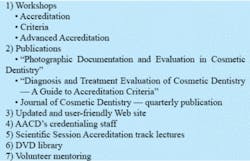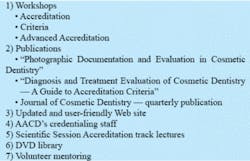The Learning Culture: Accreditation and Mentoring in the American Academy of Cosmetic Dentistry
For more on this topic, go to www.dentaleconomics.com and search using the following key words: Accreditation, dental mentoring, cosmetic dentistry, AACD, Scientific Session.
Each year the Academy is host for an annual meeting. The 2008 Scientific Session will be held May 6 to 10 in New Orleans. Leading educators from around the world will provide cutting-edge material. Thousands of participants can choose from a variety of options, including large lecture halls, small lecture rooms, hands-on workshops for dentists and lab technicians, and Accreditation track lectures. If you have never attended an AACD meeting, this may be the year for you. Should you choose to go to New Orleans, you will find an environment of high energy, and motivated doctors, staff, and lab technicians. You will have an opportunity to network with like-minded professionals.
To enhance these learning opportunities, the Academy sponsors the most thorough and comprehensive credentialing process in cosmetic dentistry. Earning AACD Accreditation requires dedication to continuing education, careful adherence to the protocols, and a resolve to produce exceptional dentistry. The three-part process includes a written exam, clinical case submission and report, and an oral exam that simulates a board certification. The clinical case submissions cover skills required for demonstrating excellence.
This process is unique in that the candidate presents actual casework for evaluation by a board of examiners. Those who have successfully completed the Accreditation process — and even many who were not initially successful — have stated that the Accreditation journey was the single most significant continuing education process of their careers.
In an effort to help those dentists and lab technicians achieve accreditation status, the AACD has a variety of resources (see box above).
"Participating in the Advanced Accreditation workshop helped me in numerous ways, such as in case selection and in learning how examiners evaluate cases so I could focus and prepare accordingly," said Dr. Rebecca Pitts, Lake May, Fla. "Most importantly, the inspiration and genuine encouragement I received from my mentors, as well as the AACD administrative team during the course, ignited my enthusiasm to move forward with the program. I highly recommend the workshop to every candidate."
Webster defines a mentor as a trusted counselor or guide. Dr. Joe Blaes, in his October 2007 Dental Economics® Editor's Note, said, "Dentists often ask me what was the most important decision I made during my career in dentistry. My answer always is my decision to get a mentor."
Dr. Scott Finley of Arnold, Md., told me that his journey to become Accredited was the most challenging and life- changing experience in his professional career.
"I felt that the key to successfully completing this learning experience was to use the resources the AACD offered," Dr. Finley said. "In the end, it was my connection with my mentor that helped to guide and encourage me around the final corner and which kept me focused on what was important in this incredible learning experience. It was inspiring to me to find that some of the finest wet-fingered dentists in the country were willing to take their time and personal interest to support me in becoming Accredited. I hope one day to provide the same kind of unselfish support and inspiration to other dentists on the same journey."
The guiding hand of Dr. Bruce Stewart of Comstock Park, Mich., was instrumental in my achieving AACD Accreditation. In our technologically savvy world with e-mail and digital photography, a mentor can be next door or across the country. The AACD Web site provides members access to those Accredited doctors and lab technicians who choose to mentor Accreditation candidates. These individuals are current examiners who volunteer to evaluate cases that candidates are considering for treatment and submission.
So, what does the mentor get in return? After all, mentoring can take time from a busy work and personal schedule. Why would an Accredited member want more competition from other dentists or lab techs?
In the town where I live, there is a steak house that was established in 1921. About three years ago, a major upscale steak house chain opened next door to this community landmark. I asked the owner if he worried about the competition, but he said something that took me aback. He anticipated the presence of the chain would bring more upscale diners to the area and that, once dining at the chain, they would seek other dining options.
"Besides," he said, "I'd be happy to accommodate overflow customers any night of the week. We want this area to be seen as a great place to eat."
Lexington, Ky., boasts a significant number of AACD accredited members. Dr. Fred Arnold, one of the first, joined with his colleagues and formed a study club to mentor and encourage even more in the Accreditation process. This moderately sized town has six Accredited members, the highest per capita anywhere.
"There is strength in numbers because AACD Accreditation is now on everyone's radar screen. This has been great for business," Dr. Arnold said. "The word is out in Kentucky that if you want to be assured of great restorative dentistry, you need to go to an AACD Accredited dentist."
Because the AACD is committed to increasing the number of Accredited members, the existing Accredited members are aware that increased recognition of the credential is beneficial to the public, profession, and them.
The word "doctor" in Latin means "teacher." A mentor can serve as a teacher but, in many cases, mentoring is a chance to not only give to but also learn from the student.
Dr. Marty Zase, immediate past president of the AACD, told me: "Mentoring is an extension of my first love as a professional: teaching. And, as any teacher will tell you, the crowning moment is when the light bulb goes on above your student's head and you watch him or her ‘get it.' Imagine the joy of seeing that in someone who is almost ready to be credentialed in excellence in your chosen profession and just needs that ‘one last step.' Providing that step is actually almost a selfish act since it gives as much pleasure to the mentor as it does value to the student.
"Mentoring, for me, has also become a seed for some lifelong relationships," Dr. Zase added. "Coaching some of the candidates has turned us into great friends. Witnessing them achieve Accreditation and sharing their joy as they receive their plaques has been the foundation of some of the most valuable relationships I have developed in the AACD. Hearing my friend cry over the phone as I informed him of his passing his fifth and final case was one of the most touching and positive moments in my professional career.
"As my mentor, Bob Nixon, once said, ‘When the student is ready, the teacher will appear.' Mentoring provides a real blessing to be that teacher when the Accreditation student is ready. I would recommend it to any who qualify and are willing to share their expertise with those who wish to learn."
Dr. Michael Sesemann, current vice-president of the AACD, said: "The bottom line is the good feeling that comes from sharing knowledge with others. When a member sees the light bulb go on or that look on a candidate's face that says ‘I get it,' it is a pretty inspiring moment. I'll never tire of that. When you go to the closing gala at the AACD annual scientific meeting and see someone you have worked with get his or her certificate of Accreditation, it is really exciting. It's a combination of being so proud of someone getting his or her reward for all of the hard work — combined with a resurfacing of the emotions I had when I was up there — you are just so happy that you were able to help someone else experience those feelings. It's special ... really special."
If you are not a member of the AACD, I urge you to join and become involved in the Accreditation process and follow Dr. Blaes' advice and find a mentor. This will also be an opportunity to establish strong, long-lasting, professional relationships with dentists and laboratory technicians. I think you will find, as many of my colleagues and I have, that it is the finest educational experience of your career. I wish you the best in your pursuit of excellence.
Bradley J. Olson, DDS, FAACD, FAGD, is a 1983 graduate of the University of Maryland Dental School. He achieved Accreditation in the AACD in 1998, and is the most recent past chair of Accreditation. He became the Academy's 39th Fellow in 2004, is an Accreditation and Fellowship examiner, and is active in credentialing workshops. Dr. Olson practices in Waldorf, Md. Contact him at [email protected].

